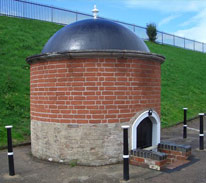
The award-winning York Handmade Brick Company has helped to restore an historic Valve House belonging to British Waterways to its former glory.
The 19th century Valve House, which is situated at Icknield Port, Birmingham, had been badly damaged by a car. British Waterways have praised York Handmade, based at Alne, near Easingwold, for doing “an excellent job”.
York Handmade was approached by British Waterways at the end of last year to provide matching bricks to rebuild the dilapidated building.
Mark Laksevics of York Handmade explained: “Special bricks were required to match the original surviving bricks for colour, texture,
size and shape. We used more than 1,000 Benchmould Lindum Blend radial stretchers and 255 radial header specials to achieve the circular coursing and original bond pattern. “British Waterways were keen to ensure that the building work would be using traditional materials and building methods and we were happy to oblige. That is our strength,” he added.
The Valve House was built between 1824 and 1827 to house water control equipment for Edgbaston Reservoir. Edgbaston Reservoir, originally known as Rotton Park Reservoir, is a canal feeder reservoir in the Ladywood district of Birmingham which supplies water to the Birmingham and Wolverhampton Levels of the Birmingham Canal Navigations canal system via Icknield Port Loop.
The reservoir was designed by Thomas Telford as part of extensive improvements made on the Birmingham Canal Navigations between 1824 and 1829. It is likely that Thomas Telford also designed the Valve House of which there are a pair, the other being located next to Icknield Port Yard.
Elizabeth Turner of British Waterways explained: “Unfortunately in the 1960s the Valve House had been completely rendered in hard cement render. This render was chipped away by British Waterways Construction Team who discovered that only 30 per cent of the original brickwork could be re-used. The existing bricks had been damaged by the impermeable render and in some areas reduced to dust.